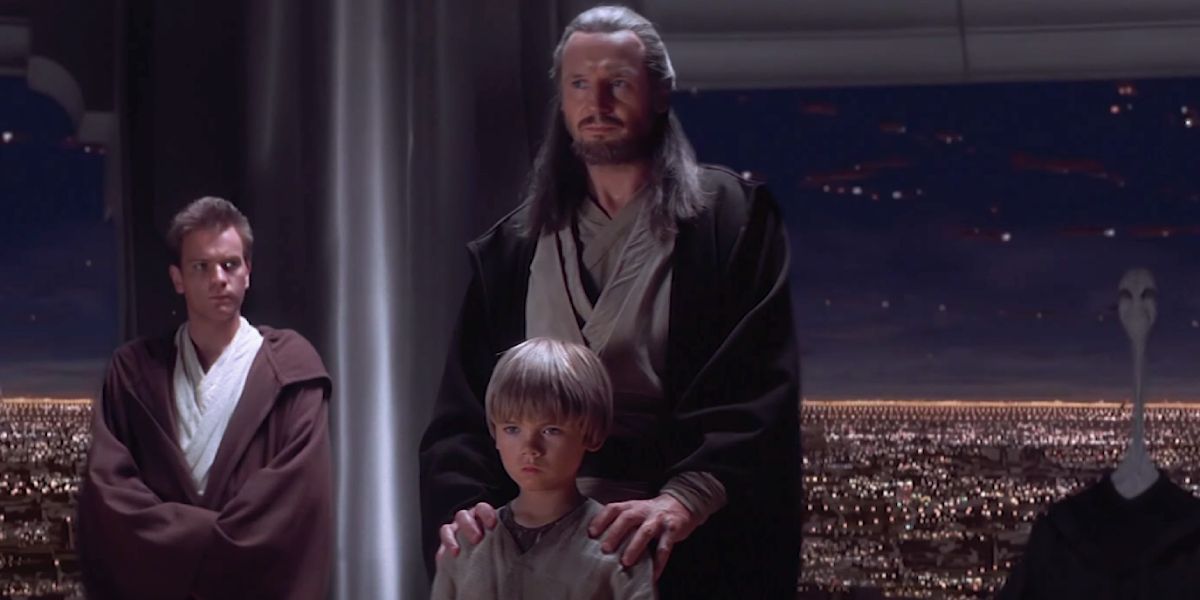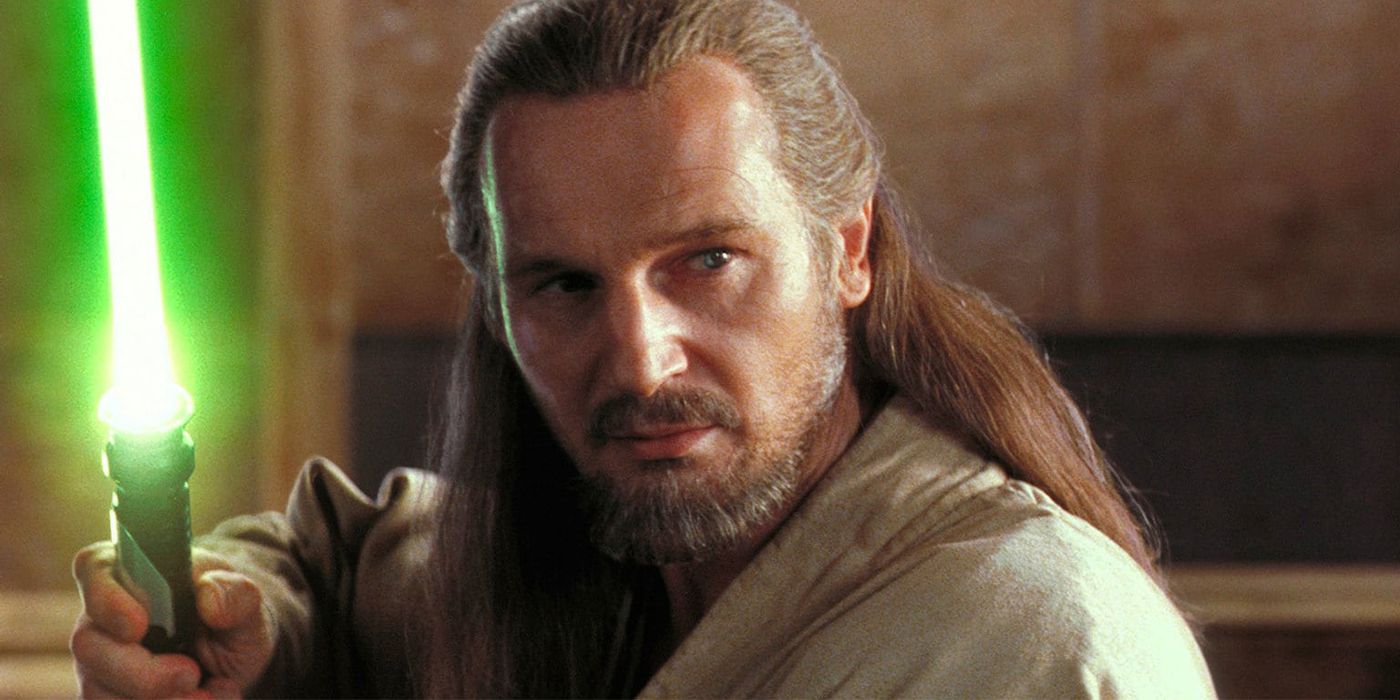Qui-Gon Jinn is easily one of the most interesting Jedi in the entire Star Wars canon. The late master of Obi-Wan Kenobi, he was known for his maverick nature, as he would often defy the Jedi High Council. The most infamous instance of this was his insistence on training Anakin Skywalker, the boy who would become Darth Vader. Some have used this fact to postulate that Qui-Gon, at least in part, is to blame for the fall of the Galactic Republic and the Jedi Order. However, when you look at the big picture, Qui-Gon was totally justified in his defiance.
It's important to note that the only reason Qui-Gon strayed from the will of the Jedi Order was because the Order had itself strayed from its original purpose. By the era in which the Prequel Trilogy is set, the Jedi were no longer the guardians of peace and justice. Rather, they had become arrogant agents of the Republic, operating with political and militaristic power they had absolutely no business wielding.
Furthermore, the Jedi were far more concerned with achieving their own ends and indoctrinating their recruits than they were with carrying out the will of the Force, which was Qui-Gon's entire motivation throughout The Phantom Menace. To that end, there's an argument to be made that he was more a Jedi than anyone on the Council.
The canon Star Wars novel Master & Apprentice reveals that Qui-Gon was actually offered a seat on the Council at one point, but turned it down, believing the others would never truly have his back. The book also offers a lot of insight into his perspective. "Qui-Gon knew the Council to be wrong about many things," its reads. "He felt they'd allowed the Jedi Order to become a sort of chancellor's police, rather than concentrating on knowing the Force. Yes, they were wise to refuse to rule -- but unwise to simply accept the status quo. Short-sighted, to lose touch with the living Force by spending so much of their time and energy on enforcing laws that could as easily be left to civilian authorities. Immoral, to refuse to act against evils such as slavery."
Qui-Gon's stance is unsurprising, given that he was trained by Count Dooku, who verbalized his own valid criticisms of the Jedi and the Republic in Attack of the Clones. But whereas Dooku took his disillusionment to the extreme and became a Sith Lord, his former apprentice continued to try and do good from within the Jedi Order.
Qui-Gon was a rule-breaker to be sure, but it's hard to decry this as being an inherently bad thing when the alternative was being just another complacent zealot regurgitating the same outdated dogma. Moreover, whenever Qui-Gon did do something questionable, it was often in service of a higher morality. Yes, he scammed Watto at every opportunity but did so in order to free a young boy from slavery on Tatooine.
This brings us back to Anakin. While it's easy to shift blame to Qui-Gon for the rise of Darth Vader, one thing that cannot be overlooked is that his original intentions were very different from the Council's ultimate actions. Qui-Gon knew better than anyone that the Force wants nothing more than to be balanced, and had reason to believe Anakin was the one prophesized to achieve exactly that.
Under Qui-Gon's tutelage, Anakin could have become one of the greatest Jedi of them all. He would have been patient and understanding and would have allowed the boy to work through his feelings of pain and fear, teaching him to carry out the will of the Force, not the will of the Republic, which was deeply corrupt.
Unfortunately, Qui-Gon met an untimely end at the hands of Darth Maul before he could really teach Anakin anything. In turn, Anakin was instead raised on the Order's dogmatic teachings. The Council wanted nothing more than another obsequious student who would do whatever he was told without question, forcing Anakin to bottle up his negative emotions and effectively turning him into a powder keg.
Obi-Wan was not a bad master to Anakin, mind you. On the contrary, for as much as the two butted heads, Obi-Wan was fairly patient with his Padawan. However, he lacked Qui-Gon's experience and was forced to become Anakin's teacher long before he was ready for such a responsibility. Obi-Wan also accepted a seat on the Council, which would imply that he strayed from Qui-Gon's ideals.
This is made all the more tragic when you look at the canon biography Skywalker: A Family at War, which strongly implies that Qui-Gon could have saved Anakin from the Dark Side had he survived the events of The Phantom Menace. "Perhaps Qui-Gon himself would have helped his Padawan return to Tatooine and free the slaves," the book reads. "At the very least, he would have empathized with Anakin's restlessness with the strict Jedi Code, offering solutions beyond the scope of Obi-Wan Kenobi's regulation-driven mind. Perhaps Shmi Skywalker would have been saved. In either case, the predatory Sith Master Darth Sidious may well have had a more difficult time manipulating young Anakin's future."
That's not to say that if Qui-Gon had not been killed, he would have been able to save the Jedi Order or the Republic -- but that's because the entire system was already rotten. The Sith were already gaining power, Palpatine had already infiltrated the Senate and the Jedi Council's arrogance made them blind to all of this. It was all going to come crashing down one way or another. That said, the point here is that Qui-Gon represented the antithesis of everything wrong with the Jedi at the time.
Mace Windu and Ki-Adi-Mundi were so arrogant they outright rejected Qui-Gon's (correct) assertion that the Sith had returned. Yoda was always so busy either pondering the past or worrying about the future that he was almost incapable of making effective decisions in the present. In contrast, Qui-Gon understood the importance of being mindful of the future, but "not at the expense of the moment." Obi-Wan taught Anakin to do what he was told, but Qui-Gon would have taught him to do what is right.
Qui-Gon Jinn is by no means infallible. He was reckless and maybe even over idealistic. But he was totally in tune with the Force and did his very best to preserve peace, justice and balance -- which is more than most of the Jedi of his era can say.




